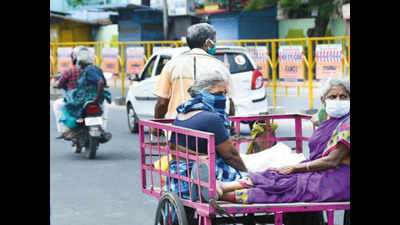- News
- City News
- madurai News
- Tricycles come to aid of hawkers in Madurai
Trending
This story is from May 27, 2020
Tricycles come to aid of hawkers in Madurai
In the absence of public transportation, a large number of hawkers have started using tricycles to transport vegetables and fruits from the market to their selling point. Tricycles are widely used for transportation of grocery goods between shops and godowns in East Masi and adjoining streets. They are now commonly found on roads transporting vendors and their goods.

Tricycles are widely used for transportation of grocery goods between shops and godowns in East Masi and adjoining streets.
MADURAI: In the absence of public transportation, a large number of hawkers have started using tricycles to transport vegetables and fruits from the market to their selling point. Tricycles are widely used for transportation of grocery goods between shops and godowns in East Masi and adjoining streets. They are now commonly found on roads transporting vendors and their goods.
Though the state government recently allowed autorickshaws to operate, hawkers could not use them as only one person could be passenger.There are close to 13,000 roadside vendors in Madurai city alone, of which 8,650 have been recognized by the corporation with identity cards. They are mostly distributed in Vilakkuthoon, South Veli Street, Kamarajar Salai, Bypass Road and Vilangudi areas.
S Ponniammal, a fruit vendor at Vilakkuthoon said “I used to go on share auto rickshaw and government buses for the purchase. Three of us have now started sharing a tri-cycle, which costs lesser,” she said. A traffic police officer said although tricycles do not cause accidents, they cause traffic snarls. Hawkers have urged the state government to operate public transport services at the earliest to save their livelihood.
Roadside Vendors Association general secretary S Sandhiyagu said they were facing various issues like police cases for “creating nuisance”, but the biggest issue was transport. Vendors not only find it difficult to procure goods for sales, but also have few takers. “They can eke out a living when people movement is increased and the only way to ensure that is to open up bigger textile stores and transport services,” he said.
Though the state government recently allowed autorickshaws to operate, hawkers could not use them as only one person could be passenger.There are close to 13,000 roadside vendors in Madurai city alone, of which 8,650 have been recognized by the corporation with identity cards. They are mostly distributed in Vilakkuthoon, South Veli Street, Kamarajar Salai, Bypass Road and Vilangudi areas.
S Ponniammal, a fruit vendor at Vilakkuthoon said “I used to go on share auto rickshaw and government buses for the purchase. Three of us have now started sharing a tri-cycle, which costs lesser,” she said. A traffic police officer said although tricycles do not cause accidents, they cause traffic snarls. Hawkers have urged the state government to operate public transport services at the earliest to save their livelihood.
Roadside Vendors Association general secretary S Sandhiyagu said they were facing various issues like police cases for “creating nuisance”, but the biggest issue was transport. Vendors not only find it difficult to procure goods for sales, but also have few takers. “They can eke out a living when people movement is increased and the only way to ensure that is to open up bigger textile stores and transport services,” he said.
End of Article
FOLLOW US ON SOCIAL MEDIA










